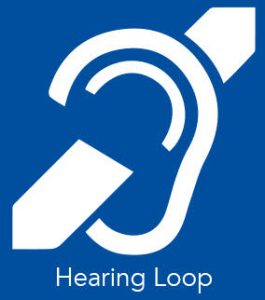Hearing Augmentation Systems
PC Audio Visual Hearing Augmentation
Does your space require a Hearing Augmentation System
Legislation in Australia requires Hearing Augmentation to be provided in rooms in Class 9B buildings under the Building Code of Australia, which have an inbuilt amplification system. This includes:
- Schools
- Universities
- Trade workshops
- Auditoriums
- Conference rooms
- Meeting rooms
- Place of worship
- Room for judicial purposes
- Any ticket office, teller’s booth, reception areas and similar areas where the public is screened from the service provider.
PC Audio Visual can provide the best Hearing Augmentation solution and installation for either existing area or from planning phase of a new development.
What is Hearing Augmentation?
Hearing augmentation systems can be defined as the communication of information for people who are deaf or hearing impaired by audio and visual means. Hearing augmentation system options:
- Audio frequency induction loop systems (hearing aid T switches can be used, or receivers provided to those without a T switch on their hearing aids).
- Frequency modulation (individual receivers worn by users to receive radio waves (i.e. FM transmitter/receiver systems).
- Infra-red (transmitter/receiver system, where individual receivers are worn by users to receive infra-red beam by a direct line of sight).
What Hearing Augmentation Solutions are available?

Hearing Loops
A hearing loop (sometimes called an audio induction loop) is a special type of sound system for use by people with hearing aids. The hearing loop provides a magnetic, wireless signal that is picked up by the hearing aid when it is set to ‘T’ (Telecoil) setting.
The hearing loop consists of a microphone to pick up the spoken word; an amplifier which processes the signal which is then sent through the final piece; the loop cable, a wire placed around the perimeter of a specific area i.e. a meeting room, a church, a service counter, etc to act as an antenna that radiates the magnetic signal to the hearing aid.
Why use a hearing loop?
- Cuts out unwanted background noise
- No need to use a receiver/headset
- The sound goes directly into the hearing aid
- Can be used by anyone with a compatible hearing aid
- It is inconspicuous
- Cost-effective
- Any number of users can use the system
FM Transmitters
FM Systems are wireless assistive hearing devices that enhance the use of hearing aids, cochlear implants and also assist people who are hard of hearing but do not wear hearing aids. In particular over distance and in noisy environments. They enable sound to be picked up closer to a speaker, sound source or connected directly to the sound source and transmitted to the individual providing greater clarity of speech/sound and a reduction in background noise.
- FM System is the generic name or term that has been given to Radio Aids.
What is the advantage of a FM System?
A FM System empowers a hearing aid wearer with their own lightweight, portable, flexible and discrete equipment that they can use in a great variety of daily situations where additional hearing assistance is required, as hearing aids alone, mainly due to background noise and distance, are not sufficient.
Infrared Systems
An infrared system is similar to a remote control and a television. A transmitter sends speech or music to a receiver using invisible infrared light waves.
With an infrared hearing loop, a person requires a special receiver, which is usually available at a customer service desk or by asking a member of staff.
Infrared receivers can either be used with headphones or a neck-loop to connect to a hearing aid / cochlear implant.
To use a receiver with a hearing aid/cochlear implant simply place the lanyard over your head so that the receiver lies on your chest — in this way it will not become obstructed or lose signal. It’s also a good practice to sit away from internal pillars or windows as this can also cause signal loss. The venue should be able to advise where to sit to receive the best signal. If you have been allocated seats that are not in line of sight of an infrared transmitter, ask to be moved to an area where the receiver can pick up the signal.

